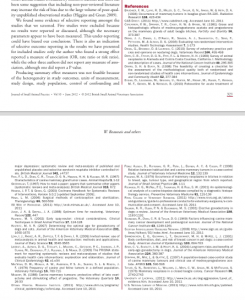But Mammary Cancer!
A common justification for early neutering of bitches is that it protects against mammary neoplasia. However, many frequently cited references are over 40 years old, and this evidence has not been scrutinised with the benefit of recent developments in epidemiological methods and knowledge of potential confounders of the association between mammary masses and neutering, such as age, breed and treatment with synthetic derivatives of ovarian steroids.
One of the most frequently presented arguments for desexing is ‘mammary cancer’. It is commonly stated that desexing bitches reduces the risk of mammary cancer.
But as always, we must ask: What does the research say?
I love to answer questions like this, and so I have read quite a bit of research on mammary cancers in bitches. However, despite doing lots of reading, none of these research papers have made their way to my blog.
The reason? The research is very old and I am not compelled to review or examine such ancient research.
Why does old research matter? It’s easy to say that ‘biology doesn’t change’, and if it was so in the 1970s, then it must be so now. While that’s the case, our understanding on research methods and limitations is continuing to improve.
Regardless, even if we say that the research from the 1970s is as accurate as ever, compelling results are those that are replicated. While it’s nice to get one study that shows a link between mammary cancer and sex hormones, we need multiple studies with large sample sizes to prove this without doubt.
Using the studies considered in Beauvais et al’s 2012 systematic review, since the 1960s, there has been approximately fifteen (15) studies on mammary cancer in the bitch. That is, the last fifty-five (55) years, there has been one study on mammary cancer in dogs in ever four years. There are very few papers on mammary cancer, and those that do exist do not replicate past results.
So how old is the mammary cancer research?

Beauvais et al.’s references in their systematic review on mammary tumours in bitches as affected by spaying.
Again, if we use the studies considered in Beauvais et al’s 2012 systematic review, there were fifteen studies in all considered. Of those studies, only one (1) of those studies was completed in the last ten years. Further, eighty-six percent (86%) of the studies are more than fifteen (15) years old. So, basically: the research is old!
Nothing excites me like a review on literature. (You can imagine what I’m like at parties.) When I noticed a systematic review by Beauvais et al. on mammary cancer in dogs (published in 2012), I was excited as I hoped I would find some more recent studies. The study did not fulfil my hopes, and so I am left believing that more recent research simply doesn’t exist.
Interestingly, the researchers made comment that a systematic review (like they produced) had seemingly not been covered before. A systematic review is used to evaluate the strength of evidence and to consider bias. This type of research is common in medical literature, but not so much in veterinary.
The researchers considered the quality of the research for thirteen reports and found “Nine were judged to have a high risk of bias. The remaining four were classified as having a moderate risk of bias.” Indeed, some studies made claims (e.g. that neutering had a ‘protective effect’) but then failed to back up these claims with evidence.
Considering that only one study found an association between neutering and reduced risk of mammary tumours, and two studies found no evidence, there is not strong evidence that desexing reduces the risk of mammary tumours.

Check out the mammaries! My girl, Myrtle, is due to whelp in a week’s time.
What does the evidence say?
Our results suggest that there is some evidence in one study that neutering is associated with a reduction in the risk of malignant mammary tumours (approximately 10-fold), amongst dogs from which samples and been submitted for histopathology, although there was no evidence that neutering after 2.5 years of age is associated with any change in the risk of malignant mammary tumours.
Basically, they concluded that there is weak evidence and there is “not a sound basis for firm recommendations“. There is some evidence that desexing before 2-5 years of age is beneficial, and also evidence that desexing before their first season may be beneficial.
The biggest faults in the existing research identified by Beauvais et al. included:
- Research failed to control for age or breed.
- No indication of age at neutering.
- Little numerical data provided in publications (which limited this retrospective study).
- Lack of consideration to bitches treated with ovarian steroids (and the effects this may have on research.)
When it comes to spaying bitches, it is important to recognise that the implications of a gonadecmomy on many aspects of the bitch. Not only does desexing affect the health and temperament of that bitch, there may be wider implications on the general population.
At the moment, vets vary in their opinion and recommendations, especially by country. I encourage owners to do their own research when making decisions for their pets.
Further Reading:Beauvais, W., Cardwell, J., & Brodbelt, D. (2012). The effect of neutering on the risk of mammary tumours in dogs – a systematic review Journal of Small Animal Practice, 53 (6), 314-322 DOI: 10.1111/j.1748-5827.2011.01220.x

